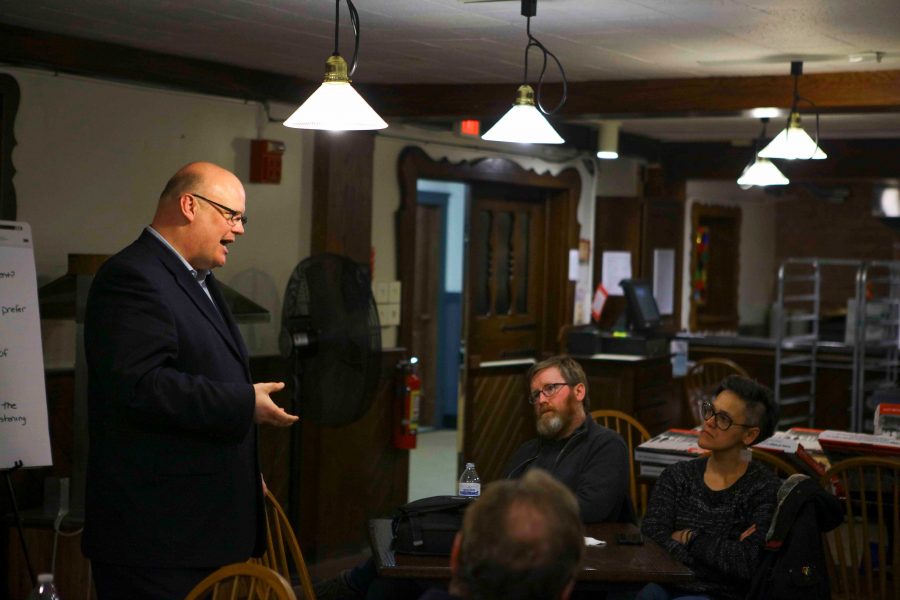Hillard Emphasizes Community Policing in Chief Search
Photo by Hugh Newcomb, Sta photographer
City Manager Rob Hillard holds a listening session with community members and students at the Rathskeller Monday evening as the search for the new police chief continues. The attendees emphasized that the new chief should prioritize residents’ well-being.
March 3, 2017
Students and community members alike sent a clear message that they want a police chief who will prioritize the well-being of city residents at a listening session in the Rathskeller Monday evening. As the search continues for Oberlin’s next police chief, City Manager Rob Hillard met with around 12 city residents and students to discuss what qualities people want in the new hire. Hosted by the city manager’s office, this was the second open listening session with members of the greater Oberlin community and the first located on the College’s campus.
“Trust is earned, trust is not automatically given,” said Oberlin resident Carmen McFarlin. “Through accountability and through recognizing that as the police chief, there is a certain duality there in that they are responsible to the community, but they are [also] responsible to their staff. ere will be situations in which those two things come in conflict, … so I would like a police chief who understands that they work for us, and that they are not there to protect their officers from us.”
The crowd Monday was significantly smaller than the 80 people who attended the first listening session at Kendal at Oberlin Feb. 16. Hillard said in a statement to the Review that constituents at both sessions expressed similar concerns.
Hillard, who is in his 12th week as city manager, maintains sole responsibility for appointing the next police chief. He urged locals to identify the ideal qualities and policing practices they hope to see become more common in the department.
Joe Peek, a lifetime Oberlin resident and local substitute teacher, said he hopes the replacement avoids targeting petty drug crimes and ensures the community’s overall safety.
“I want an enforcer who is hell-bent on reform of the mistakes and the disparities of yesterday’s less-than-blind justice,” Peek said. “We’re paying your salary, so we want them to do the things we want them to do. What those [things] are, I am open to. But I am sure it’s not some of the things that many of the police officers and departments do around this country, which is getting stripes by pocketing low-level drug users. … At least at home, I want to be comfortable that our police force works for us.”
Students reiterated this sentiment, arguing that they have witnessed excessive police enforcement of petty crimes and alleged racial profiling of young people of color.
Michael Martinsen, Oberlin’s new director of Safety and Security, added that officers who have been in the field for some time would also likely bene t from training, not just new recruits.
In response, Hillard echoed that over-enforcement and racial bias are practices he does not endorse and that he hopes to choose someone who will practice effective community policing.
While the tone in the room was overall positive, some students challenged Hillard to give more concrete details on how the search process is being carried out. Sarah Johnson, OC ’15, asked Hillard “to get a little bit more specific about what’s informing the language that is being used to discuss these issues … to name a couple of resources, best practices or cities that you are looking to as a model for the kind of policing you would like to see in Oberlin.”
College junior Jake Berstein also urged Hillard to explain to the group why they should trust him to make such an important decision.
In response to both questions, Hillard referred to his prior experience as city manager of Yellow Springs, Ohio, home of Antioch College. Yellow Springs is a small town with a similar history of college and community divide where Hillard witnessed successful police chiefs and effective community policing.
As for the hiring process, Hillard responded that he and his office are strategically advertising the position to attract a diverse candidate pool. A panel will then recommend three to five candidates for Hillard to choose from. He emphasized that community input is essential in making this decision.
“I believe in community policing, and that’s a buzzword, … but community policing to me is actually knowing individuals,” Hillard said. “It’s knowing the environment you are in.”
The city manager’s office has planned three more listening sessions on policing. There will be sessions for the Oberlin business community at the Oberlin Public Library at 8:30 a.m. this Tuesday and at Mt. Zion Community Center 5 p.m. Tuesday, March 14. The final hearing will be Tuesday, March 21 at 6 p.m. at the Oberlin Public Library.
















